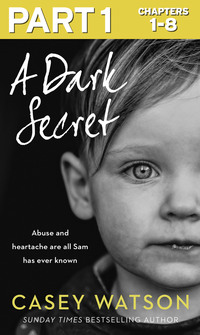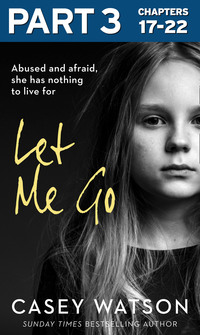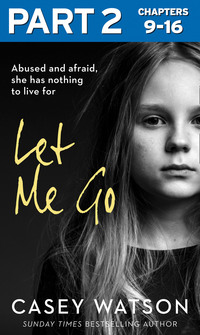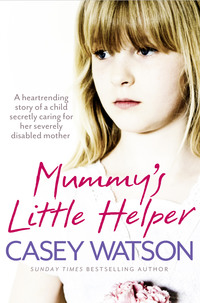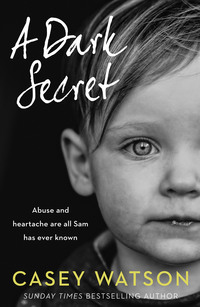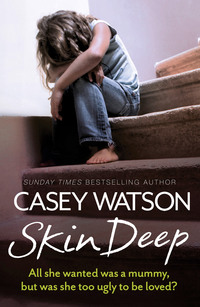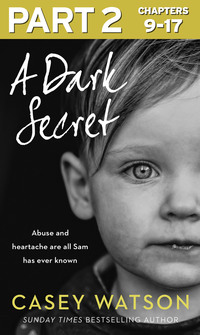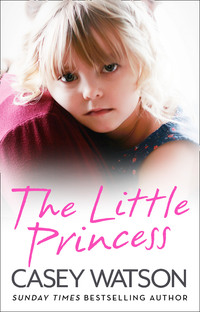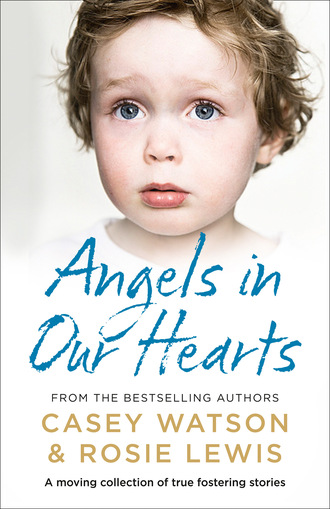
Полная версия
Angels in Our Hearts
Sue suddenly appears in the corridor, flanked by another member of staff. ‘This way,’ she trills. The attendant, a stout, short woman with cropped hair, leads the way down another bleak corridor, this one separated by several iron doors. Reaching for the large bunch of keys hanging from her waist band, she turns to us. ‘Stay near the door so you’ve got a quick exit if you need one,’ she mouths, ushering us into a side room.
Alarmed, I stare wide-eyed at Sue but she waves her hand. ‘It’s alright, I’ll be right beside you.’ Suddenly I find her redoubtable presence hugely reassuring and wonder if I’d be just as forbidding after twenty years doing her job.
The room is small and at the far end an overweight young woman lies face down on a bed. Barely out of her teenage years, she lifts her head slowly as we enter the room, such a delayed reaction that I wonder if she is heavily sedated.
‘Morning, Sam,’ Sue says, briskly. ‘You’ve only got half an hour’s contact so come along, sit yourself up.’
Obediently, Sam rises, her flimsy T-shirt riding up. Deep scarlet stretch marks and sagging skin remind me how recently she gave birth. The young woman glances towards me through a curtain of dark, lank hair with heavy, swollen eyes. She meets my gaze and I smile but she doesn’t respond, looking quickly away. From outside I can hear the constant murmur of voices, the occasional sound of running feet. My palms begin to sweat.
‘Hello, Sam.’ Smiling nervously, I release the baby from her papoose. Sarah immediately objects, drawing her legs to her stomach and yowling. Wary of making any unexpected moves, I glance towards Sue for direction.
‘Yes, go on, hand her over,’ she says in a tone that tells me she is accustomed to being obeyed.
Gently, I lay Sarah in her mother’s waiting arms. A dank, unwashed smell rises from Sam’s body and I feel a moment’s revulsion. Sarah screams and her mother takes this as a signal of hunger, lifting her T-shirt and releasing one of her pendulous breasts. With armpits raised the smell intensifies and I take a few steps back, forcing myself to focus on an unpleasant-looking stain in the middle of the carpet.
Oblivious to my embarrassment, Sam ‘encourages’ Sarah to latch on by slapping her over the face with an engorged nipple. Sarah tries to wriggle away from the mammary onslaught, throwing her head wildly from side to side. She yowls piteously, her skin the colour of beetroot.
Sue remains near the doorway, her expression watchful. Sam groans at her baby’s refusal to co-operate and I can sense her growing impatience. A vein throbs in my temple as maternal protectiveness roars up in me but I set my jaw and force myself to ignore it. It’s easy to forget that I have no rights to this baby. My eyes flick between Sue and Sarah, feeling utterly helpless. The social worker appears too engrossed to perform a rescue, scribbling away in her notebook.
‘I have a bottle in my bag if you’d prefer …’ I offer in a quiet voice.
‘Oh, for fuck’s sake.’ Sam releases her grip and Sarah’s tiny head, downed with a thatch of hair the same colour as her mother’s, lolls back awkwardly. ‘Why won’t she shut up?’ She looks up at me accusingly. ‘’ere, take her.’
Biting down a sudden spasm of contempt, I take the sobbing baby into my arms and rock to console her. Her sleep suit is damp with perspiration. Had Sam shown some concern for her child, some remorse, I might have felt more empathy. Did she not realise the suffering her addiction had caused?
‘Contact suspended for today,’ Sue announces, snapping her notebook shut.
Sam stares rigidly ahead as I back towards the door, her face expressionless.
It’s funny how quickly our family adjusts to the needs of new arrivals, how normal it all becomes. When Sarah has been with us for almost four weeks, I pick her up from her cot and realise that the wail that was so nauseating in its pitch during her first fortnight has already toned down to an ordinary cry.
Encouraged, once the children leave for school I crank the heating up, then run the bath. Affronted by being undressed, Sarah shrieks, her features crumpling with rage but as I lower her into the warm water, her muscles instantly loosen. Her feet, usually arched in pain, flex and begin to wriggle in the solace of the water. Her legs fall open at the knees and tiny hands stretch to form a starfish.
Wrapped in a towel I take her back downstairs and lay her on the fluffy rug in front of the fire, amazed that she is still lying contentedly despite not being attached to my chest. Rubbing my hands together to warm them, I roll her onto her tummy and her head rests to the side. Confusion crosses her features and she opens her tiny mouth to protest but as I massage the soft skin on her back with gentle fingers she relaxes, expelling a tiny breath of air.
Witnessing Sarah as she blossoms fills me with a sense of achievement, reminding me of the joy I felt a few weeks into my first placement, eight years earlier. I was daunted when the three young siblings arrived. As they sobbed in their beds I buried my face in my hands, almost as bewildered as they were. A few weeks later I realised that trusty old-fashioned love, routine and discipline is often all the expertise that is needed to see a transformation.
When she’s dressed and back in her blanket I drop her next feed into a jug of hot water and hold her in my arms at the garden door while we wait for the milk to warm. Her eyes flicker to our horse-chestnut tree, the bare branches swaying in the winter breeze. ‘When summer arrives we’ll be out there on the grass, warming our feet in the sun,’ I tell her as I brush a kiss on her soft cheek and inhale her sweet, infant scent. Rocked by a sudden feeling of déjà vu, I realise she smells the same as my own babies did.
Her hand rises up out of the blanket and searches the air, coming to rest inside the collar of my cardigan. She clenches it and I coo at her, tilting her up to kiss her cheek. With parted lips, her eyes narrow and she bestows a fleeting, crooked smile. A sudden rush of love besieges me. No, don’t let yourself, I silently counsel.
By the end of our fifth week together, when Emily and Jamie leave the house I light the coal fire to bring a bit of cheer into the living room and turn the radio to Smooth FM. Sarah turns her head and watches as the flames sputter into life, her legs scissoring jauntily in response to the music. I’m thrilled. Clearly the drugs in her system haven’t adversely affected her hearing.
Bending on all fours, I lift her vest and lean in to kiss her tummy. She gurgles in delight, her pleasure bolstering my decision to reject the safer caring plan presented to me when I first registered as a foster carer. One of the conditions of the plan is that carers must agree never to tickle foster children. I refused, only signing when that particular condition was removed. Several other carers followed suit, in agreement that there are times when tickling is appropriate. Of course, I wouldn’t launch myself on a child who may have been sexually abused but why shouldn’t a newborn baby know what a raspberry feels like, just because they’re a ward of the state?
Worn out by the excitement, she begins to grizzle so I wrap her in a blanket and gather her in my arms, settling the two of us on the sofa. She lies for a few moments looking up at me as I hold her snugly. Watching her eyes flicker, my head drops back and for a few minutes we doze together.
The telephone jerks me awake. Irritated, I reach for the cordless phone with my spare hand.
‘Hello?’
‘Hi, Rosie.’ It’s Desmond. He hesitates for a moment and I tense, sensing bad news. Complaints against foster carers are common, particularly when mothers see another woman cradling their own newborn baby.
‘Oh dear. Go on, what’s up?’
‘The local authority is moving Sarah on to other carers, quite soon. Next week in fact.’
‘Moving her? Why?’ I glance down at her peaceful face, feeling suddenly angry. I had heard of children moving foster placements for financial reasons. Social services make an effort to place their looked after children with locally registered carers but if they are full or they refuse a placement, agency carers are employed. If a local authority carer then becomes available, the child is sometimes moved on, even if they’ve been settled somewhere for a considerable amount of time. I close my hand around the receiver so tightly that the muscles in my arm begin to ache.
‘Don’t worry, it’s not what you think. The local authority have a couple who have just passed panel and are desperate to adopt a baby. They registered specifically for that reason. The sooner she’s settled, the better.’
I feel as if a cold band is clamping around my heart. I know he’s right, of course. It will be wonderful for Sarah to get the inevitable move over with while she’s so young, so that the new couple are all she’ll ever remember. It’s a system that has worked well in the US and I had read somewhere that various local authorities were trialling the procedure in the UK. The couple risk heartbreak if the local authority is unsuccessful in their application for a full care order, but if Sarah becomes available for adoption, she’ll be settled in a permanent home much sooner than is usual.
I have to wait a moment for the constriction in my chest to ease before I manage to whisper, ‘OK, that’s fine.’ Leaning down, I touch Sarah’s warm forehead with my nose, taken aback by the speed events are taking. Ending the call, I sit listening to the sounds of Sarah’s even breathing and chastise myself for not managing to put my own feelings aside.
Ten a.m. the next morning I’m sitting on a fabric-covered couch in the local authority reception with Sarah fast asleep in my arms, watching the comings and goings of council employees. Sarah’s breathing is deep and regular and, as I watch her, I feel my own heartbeat slowing down.
After a few minutes Sue appears. ‘We’re ready for you.’ She crooks her finger. Obediently I follow her down a corridor decorated with children’s drawings and several posters featuring smiling children above the words, ‘Could you foster?’
Sue stops outside interview room two. From inside I can hear low voices and my heart beats in my throat. Meeting prospective adopters feels almost as nerve wracking as embarking on a blind date. Preparing for the worst and clenching Sarah so tightly to me that my jagged nails dig into my palms, I’m pleasantly surprised when Sue throws the door open on a young couple in their mid-thirties. Perched nervously in seats positioned side by side, they release hands and look up, smiling widely. Most adopters are in their early forties at least and I’m pleased they’re a bit younger than average. It means that they may go on to adopt again in the future. It’s a comfort to think that Sarah might not be an only child.
‘Kate, Paul.’ Sue waves her hands through the space between us. ‘This is Rosie Lewis, Sarah’s foster carer.’
The couple rise in unison, both proffering their hands to shake. Shifting Sarah into my left arm I offer my right, reassured by the firmness of their grip. They meet my eyes and smile warmly. ‘It’s lovely to meet you,’ Kate says, her eyes shining as she glances down at Sarah. I like them immediately.
‘Please.’ Sue gestures for us to sit down and wastes no time getting to the point. ‘We went to panel this morning. It was unanimously agreed that Paul and Kate are a perfect match for Sarah. So, we’ll be able to get her settled into her new home for Christmas.’
‘That’s wonderful news,’ I hear myself say, gulping down the rising emotion in my throat. Meeting her new parents brings home the inevitability of our own little separation. ‘Would you like to hold her?’
Kate sits with one leg crossed over the other, jiggling her foot. ‘Oh yes,’ she says, nodding vigorously and turning to smile at her husband. Their eyes burn with passion as I place their future daughter in her arms.
Paul leans over and pulls the shawl down to reveal Sarah’s face. She is awake now, gazing up at the new faces with interest. Kate holds out her finger and Sarah reaches out, clasping it as she did mine on the day I first met her. Paul’s eyes fill with tears. The couple exchange glances and smile at each other. I turn away, feeling like an unwelcome intruder spying on a private moment.
‘Perhaps you could tell Paul and Kate a bit more about Sarah,’ Sue prompts, an unusual gentleness in her tone. ‘Give them an idea of her routine and what’s she’s like to care for.’
‘She’s lovely, so lovely,’ I say, embarrassed to find my voice cracking.
Sue’s habitually sour, downturned expression softens. She reaches out and rubs my arm, a brisk but comforting gesture. I’m overwhelmed with gratitude at the unexpected show of sympathy.
In the days leading up to the handover I find myself talking to Sarah all the time, trying to hold back my nervousness at letting her go, knowing I’ll probably continue to rock for days after she has left my arms.
The night before she is due to leave I sleep uneasily, tossing and turning. My dreams are confused and when I wake in the morning I feel the same flat sadness of the last few days but decide against trying to shrug it off. It might help me to stay calm, distanced.
When I pick Sarah up from her crib at 6:30 a.m. she is wide awake and gazing around. She catches my eye and smiles so adoringly that my stomach lurches with a longing to keep her. Warming some milk, I realise it’s the last bottle I’ll ever give her. She seems to sense this, frowning in puzzlement as she sucks. I sing through my lullaby repertoire, to give her nice memories to take to her new home.
After her bottle Emily and Jamie ask to give her a short cuddle. They both seem reserved this morning and I feel another little stab of guilt, hoping these endings don’t haunt them when they’re older. I remind myself that fostering has helped them to develop a strong sense of empathy and kindness.
‘Good luck, Sarah,’ they call out before leaving for school. Tonight I plan to take them for a pizza as a reward for being part of a fostering family. It will be good to be out; the house seems to echo with an unwelcome silence for days after a placement has ended, especially a much-loved one. Anyway, Emily and Jamie deserve the important part they play in children’s lives to be acknowledged.
Forcing a bright smile as I wave the children off, I lay Sarah in her crib, watching as she slowly turns her head from side to side. Her eyes drift to the twinkling lights twisted around a miniature Christmas tree on the hearth. Transfixed, her tiny lips form the shape of an ‘O’. Minutes later her tiny fingers uncurl and she drops off into a relaxed sleep, reminding me how far she’s come in a short period of time. Six weeks ago she was tucked up tightly in a ball of drug-induced pain.
While she’s resting I pack her memory box, filling it with items that her adoptive parents will hopefully keep safe for her. I label everything carefully, including a blanket that her birth mother was thoughtful enough to buy before she went into labour and a little pink rabbit with a rattle inside, a present from her grandmother. Little details that may mean so much to her when she’s older. I’ve also written her a life-story book filled with photos of our family, so that she has a record of where she spent her first few weeks of life. Sitting on the floor, I allow myself a few tears as I close the lid, unable to hold back any longer.
When I open the door to Desmond half an hour later I’m sure he notices my swollen eyes, but he knows better than to mention it. It’s a sight he’s seen on a fair number of occasions and I’m grateful for his sensitivity. I know he will hang around when the adoptive couple have left with their new daughter, to hold my hand and congratulate me on a job well done.
‘You’s looking particularly dreadful this morning, Rosie,’ he jokes, aware that any hint at sympathy would set me off. I hoot with laughter, the chuckle catching as a little sob at the back of my throat.
Some foster carers are able to cope with separation more easily than others. I was hoping that with time I would get better at letting go, but I’m still a work in progress as far as that’s concerned. With babies I find it particularly difficult to keep my distance and not become attached, even though I know my job requires me to maintain a cool professionalism.
For the next half an hour, while we wait for the new couple to arrive, I busy myself folding Sarah’s freshly washed little clothes and packing them into her new Peter Rabbit suitcase. Desmond chatters away in the background but I hardly notice what he’s saying, I’m so distracted. I try not to look at him, knowing that if I meet his eye my guard will come crashing down.
With fifteen minutes to pass I sit on the sofa, Sarah in my arms. I take a few deep breaths, trying to dislodge the uncomfortable knotting sensation in my stomach. Wanting some warning before they descend, so that I can gather myself, I fix my eyes on the window, watching the part of the road I can see beyond the front garden.
Paul and Kate arrive a few minutes earlier than planned, no doubt itching to begin this next exciting phase of their lives. It seems like such a long time since I first met them, even though it was only a week earlier. With older children the handover periods tend to be much longer, but with a baby as young as Sarah it’s over with quickly, with only one or two pre-planned meetings before the big day.
The atmosphere is a little forced as I fuss around offering them tea and biscuits, my breakfast churning vengefully in my stomach. Kate perches on the edge of the sofa, her mouth working at the edges. Her husband hovers in the doorway, his eyes barely leaving Sarah’s peaceful face as she snoozes in her crib. They’re probably desperate to get away but the formalities have to be attended to, medical information imparted, etc. I try to keep the atmosphere light; this is, after all, one of the happiest days of their lives. I have heard that adopters find the final handover day almost as traumatic as the foster carer, as if they’re stealing someone’s own child.
With details exchanged and forms signed there is not much else to be said. Unexpectedly, Kate walks over and squeezes my arm. ‘I want you to know we’ve waited a long time for this day. Thank you for taking such good care of her.’
The well of tears I was fighting to hold down threatens to overflow. Reassured that Sarah is going to someone sensitive and kind, I gulp, nodding in acknowledgement. I don’t really trust myself to speak as I lift the sleepy baby from her crib, tucking her blanket gently around her.
‘Well, tha’ seems to be everything covered,’ Desmond says as he walks over to me, tactfully touching my shoulder to remind me that we have a job to do.
Surrendering someone so vulnerable to an unknown future feels unnatural, wrong even. Every instinct shouts at me to hold on to Sarah but I summon all my mental energy and brush a brief kiss on her warm forehead. ‘Be happy,’ I whisper, ignoring the ache in my chest and planting her firmly in the social worker’s arms.
As Desmond turns to cross the room I hold onto the thought that whatever life holds in store for Sarah, at least during her first six weeks she was cocooned, suspended for a short while in a net of love and safety. I hope that I’ll see her again one day, even though I know it’s unlikely. Adoptive couples often prefer to draw a line under the past, a sentiment I can sympathise with, however difficult it can be for foster carers to accept.
‘Do you think she’ll be alright?’ I ask Desmond as we watch her for-ever parents settle Sarah’s seat into their car then exchange a tender kiss over the open passenger door. I give up trying to hold back the tears.
‘She is a much-wanted child.’ Desmond, a rock at times like this, wraps a steady arm around my trembling shoulders and draws me back into the house. ‘They’ll cherish her,’ he assures me, leading me into the kitchen. ‘You’s no’ to worry. Now, put tha’ kettle on. I need to give you the heads up on an urgent case we’ve just had in.’
And so the wheel turns, I think, as I never cease to wonder how lucky I am to have found such a special job.
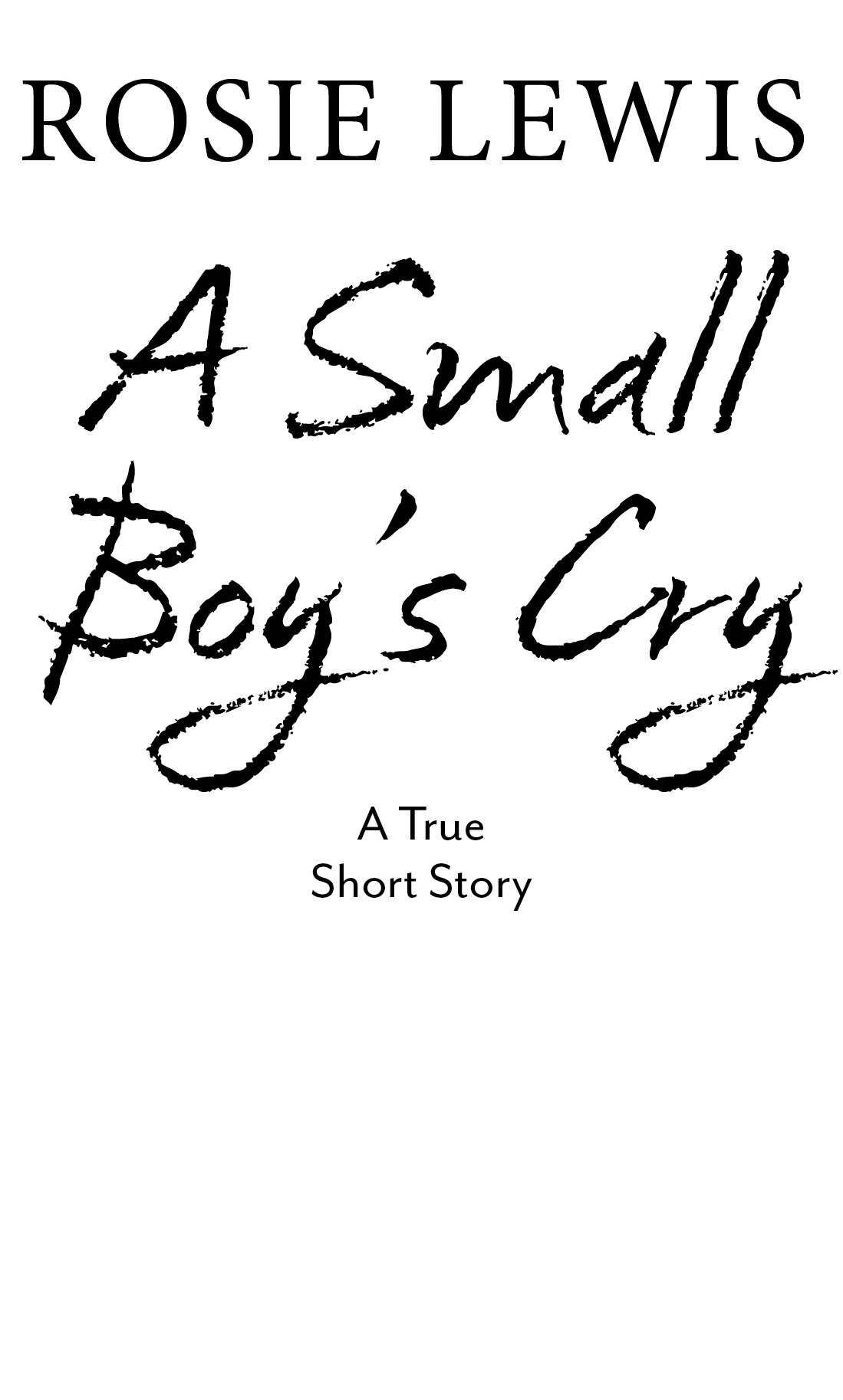
Конец ознакомительного фрагмента.
Текст предоставлен ООО «ЛитРес».
Прочитайте эту книгу целиком, купив полную легальную версию на ЛитРес.
Безопасно оплатить книгу можно банковской картой Visa, MasterCard, Maestro, со счета мобильного телефона, с платежного терминала, в салоне МТС или Связной, через PayPal, WebMoney, Яндекс.Деньги, QIWI Кошелек, бонусными картами или другим удобным Вам способом.




